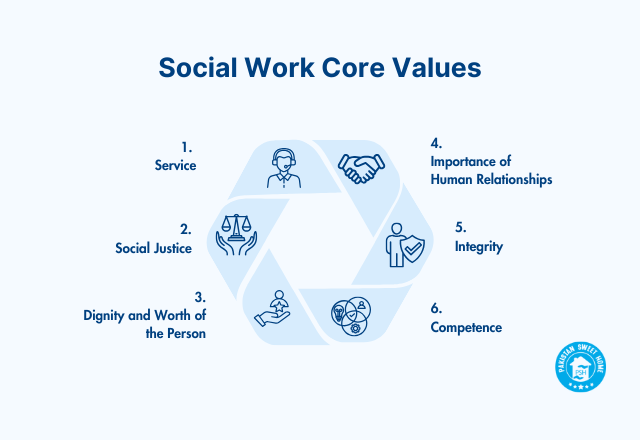Not sure what degree you need to be a social worker? That question stops many from starting.
It’s frustrating to feel called to help others but unsure which path leads to a real career. With so many degrees and requirements out there, it’s easy to feel lost before you even begin.
But having a clear, simple guide can turn your passion into a real, rewarding career.
Here’s what you need to know about the degrees, where to study, how long it takes, and the steps to become a licensed social worker.
What Degree Do You Need to Become a Social Worker?
To become a licensed social worker, you must complete a degree in social work. This is because social work requires specific training and knowledge in human behavior, ethics, policy, and hands-on practice. Even if you have a degree in another field, you will still need to earn a degree in social work to be licensed.
Here are the most common degrees in this field:
1. Bachelor of Social Work (BSW)
A BSW is the starting point for most people entering the field. It provides you with foundational knowledge in:
- Social work practice with individuals, families, and communities
- Social policy and legislation
- Cultural diversity and human rights
- Ethics and advocacy
- Human behavior in social environments
BSW programs usually take four years to complete. They also include a mandatory fieldwork component, where students work in real social work settings under supervision. These internships prepare students for the day-to-day tasks of the profession and help meet licensing requirements.
After completing a BSW, you may be eligible to apply for entry-level social work licenses, depending on your state. Some common job titles for BSW graduates include:
- Case Manager
- Family Support Worker
- Mental Health Assistant
- School Social Worker
- Crisis Intervention Specialist
- Clinical Social Work
2. Master of Social Work (MSW)
If you already have a bachelor’s degree, especially in a related field, you can pursue a Master of Social Work (MSW). This graduate-level program dives deeper into social work theories, research, and clinical practice. It's also the next step if you want to become a licensed clinical social worker (LCSW).
MSW programs usually take about two years to complete full-time. Some programs offer an advanced standing option, which allows students with a BSW to finish their MSW in about one year. Like BSW programs, MSWs include required fieldwork—usually 900 hours.
With an MSW, you can apply for higher-level licenses, such as:
- Licensed Clinical Social Worker (LCSW)
- Licensed Independent Social Worker (LISW)
- Licensed Independent Social Worker with Supervision (LISW-S)
MSW graduates often work in more specialized roles, including:
- Clinical Therapist
- Hospital Social Worker
- Substance Abuse Counselor
- School Counselor
- Policy Analyst
Should You Choose a BSW or an MSW?
Both degrees are valuable, but the right choice depends on your current education level and career goals. If you’re new to college, a BSW is the best place to start. It gives you the tools to begin your career and opens the door to entry-level positions.
In some states, like Ohio, earning a BSW qualifies you to apply for several licenses. These include Social Work Assistant (SWA), Licensed Social Worker (LSW), and Chemical Dependency Counselor Assistant (CDCA).
If you already have a bachelor’s degree in another field or want to advance in your career, an MSW offers more opportunities. MSW holders are eligible for higher-paying jobs, can work independently, and can even open their practice.
The Importance of Accreditation
When selecting a social work degree program, make sure it is accredited by the Council on Social Work Education (CSWE). Accreditation ensures that the program meets national standards for education, training, and ethics.
Most states require you to graduate from a CSWE-accredited program to be eligible for licensing. These programs must also include a certain number of hours of supervised fieldwork:
- 400 hours for BSW students
- 900 hours for MSW students
Online Degree Options in Social Work
Many schools now offer online BSW and MSW programs, which are ideal for students who need flexibility. These programs allow you to study at your own pace while balancing work, family, and other commitments.
Online programs often include virtual classes, discussion boards, and digital assignments. They also provide in-person field placements arranged in your local community. When choosing an online program, look for one that’s CSWE-accredited and matches the quality of on-campus education.
Is a Social Work Degree Worth It?
Absolutely. Whether you choose a BSW or MSW, earning a degree in social work gives you the tools to make a real difference. It prepares you for a career filled with purpose, growth, and opportunity.
The path you choose—BSW, MSW, or even a doctorate—depends on where you are now and where you want to go. But one thing is certain: with the right education and a compassionate heart, you can become a vital force for good in the world.
If you're ready to take the next step, explore accredited programs that match your schedule and goals. Social work is waiting for passionate people like you to lead the way.
Where Can You Study Social Work?
Social work degrees are offered worldwide by many accredited universities. When choosing a program, consider:
- Accreditation: In the U.S., look for programs accredited by the Council on Social Work Education (CSWE).
- Field placement opportunities: Real-world practice is crucial.
- Faculty expertise: Professors with real social work experience are invaluable.
- Program format: Online, in-person, or hybrid options can suit different lifestyles.
Top Universities for Social Work Degrees
United States
- University of Michigan
- Columbia University
- Washington University in St. Louis
United Kingdom
- University of Edinburgh
- University of Birmingham
- London School of Economics
Canada
- University of Toronto
- McGill University
Australia
- University of Melbourne
- University of Sydney
Choosing the right school can influence the type of job opportunities you’ll have after graduation.
What Comes After Your Degree? Licensing Steps for Social Workers
Earning your degree is a major milestone. But there are still a few important steps before you can officially practice, especially if you aim to become a licensed clinical social worker (LCSW).
Here’s what the process usually looks like:
1. Complete Fieldwork Requirements
Fieldwork is also known as a practicum or internship. It is a crucial part of every social work program, particularly at the bachelor’s and master’s levels. It allows students to apply what they've learned in the classroom to real-world situations.
- Students are typically placed in settings that match their area of interest, like child welfare, healthcare, or mental health.
- Fieldwork is done under the supervision of a licensed clinical social worker (LCSW).
- Each state sets its required number of field hours for licensure, so it’s important to check with your state’s social work board.
This hands-on experience is not only a graduation requirement but also a stepping stone to becoming fully licensed.
2. Pass the ASWB Exam
After completing an MSW and gaining supervised work experience (usually two years), graduates must take and pass a licensing exam from the Association of Social Work Boards (ASWB). This exam evaluates your readiness to practice at various levels:
- Associate Level – For jurisdictions that license individuals without a social work degree.
- Bachelor’s Level – Focuses on basic knowledge and social work principles.
- Master’s Level – Tests more advanced, specialized skills.
- Advanced Generalist – Covers nonclinical but in-depth practice knowledge.
- Clinical Level – Required for those aiming to become licensed clinical social workers (LCSWs).
Each exam ensures that social workers have the right knowledge and decision-making skills for their chosen field.
3. Apply for Licensure in Your State
Once you’ve passed the ASWB exam and completed your supervised practice, the final step is to apply for licensure through your state’s social work board. The requirements vary depending on where you live.
For example, Delaware requires applicants to submit:
- A criminal background check (FBI)
- A child protection registry consent form
- ASWB exam score verification
Some states process applications quickly, while others may take several weeks to months. Always check with your local licensing authority to understand your timeline and ensure you submit everything correctly.
How Long Does It Take to Become a Social Worker?
Here's a typical requirement timeline depending on the path you choose:
- Associate Degree: 2 years (entry-level positions only)
- Bachelor’s Degree (BSW): 4 years
- Master’s Degree (MSW): 2 additional years after BSW (or longer if your undergrad was in another field)
- Doctorate (DSW or Ph.D.): 3–5 years after MSW
So if you're aiming to become a clinical social worker, you're looking at around 6–8 years of education and training.
Why Choose Social Work as a Career?
Social work is a deeply rewarding career that allows you to make a real difference in people’s lives—whether supporting children, aiding recovery from addiction, or offering mental health guidance.
It’s not only emotionally fulfilling but also professionally stable, with growing demand across healthcare, education, and non-profits. According to the U.S. Bureau of Labor Statistics, employment of social workers is projected to grow by 7% from 2022 to 2032, faster than the average for all occupations.
Benefits of a Career in Social Work
Pursuing a career in social work brings a range of personal and professional rewards:
Helping others leads to a deep sense of satisfaction. Knowing your work has a real impact makes every day meaningful.
With growing needs in healthcare, education, and community work, social service professionals are in high demand.
- Opportunities to Specialize
You can find a niche that suits your passion, whether it's problem solving, or working with children, seniors, patients, or advocacy groups.
Social workers earned a median annual salary of $55,350 in 2022, with those holding master’s degrees earning even more, according to the National Association of Social Workers.
- Flexible Work Environments
You can work in schools, hospitals, non-profits, government agencies, or even start your practice.
In conclusion, understanding what degree you need to be a social worker is the first step toward a meaningful and impactful career. A Bachelor’s (BSW) or Master’s (MSW) in Social Work gives you the knowledge and skills you need to start your career with confidence.
An individual can pursue these degrees at accredited universities or online institutions offering flexible learning options. After earning your degree, you must complete supervised fieldwork and pass the ASWB exam to get licensed.
Social work is more than just a profession—it’s a purpose-driven path with real benefits. It offers emotional fulfillment, job stability, and opportunities to work in diverse sectors like healthcare, education, and community services.
For those passionate about helping vulnerable children, working with a trusted orphanage center like Pakistan Sweet Home (PSH) is a powerful way to make a difference. Becoming a social worker opens doors to supporting orphans and advancing orphan care.
Help Orphans Smile Again!

info@pakistansweethome.org.pk
(051) 4865856
+92 335 1118477









